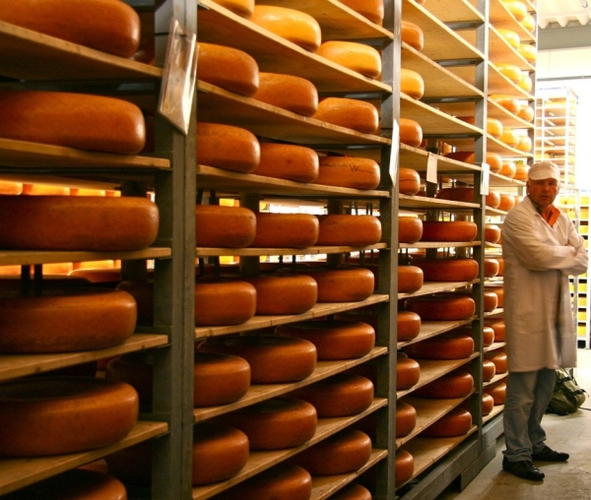BRATTLEBORO — If Vermont had to choose a “second-in-command” cheese to sit beside cheddar, I would nominate gouda.
Sure, gouda is not nearly as ubiquitous here as cheddar is, but not only is it up-and-coming, with three Vermont makers currently producing it, ۥ but gouda's flavor profile nicely straddles that of cheddar.
Plus, smaller shops and even some larger grocery stores are catching on, and offer interesting Dutch goudas rarely found just a few years ago.
Taylor Farm is perhaps the best-known Vermont-made gouda.
The Londonderry cheesemaker produces its classic and smoked varieties using the raw milk of its own herd of cows. Although Taylor Farm Smoked Gouda is pricier than the rubbery, mass-produced, tubular logs most shops sell, the nuanced, buttery flavor and the pliable, toothsome texture make the few extra dollars entirely worthwhile.
Boston Post Dairy, located in Enosburg Falls, makes Trés Bonne, a gouda-style cheese using its farm's goat milk. It's sweet, nutty, and gentle, and is one of those cheeses I like to give people who claim they don't like goat cheese.
I am usually pretty good at stifling a laugh as I hand them some and listen while they kvell about this great cheese. Surprise! It's goat!
Also in northern Vermont, Craftsbury Common's Shadagee Farmstead makes an eight-month Vermont Farmstead Gouda using the milk of its own herd of cows.
Joe Green, cheesemonger at Grafton Village Cheese Company's retail shop, says this cheese “has a nice texture” and it's gaining traction.”
Although Grafton's Vermont Leyden is a slight deviation from traditional gouda because of the addition of cumin seeds, both cheeses' recipes originated in Holland.
While I don't tend to favor “stuff” in my cheese, cumin works well to add warmth and doesn't overpower the buttery, tangy cheese.
Some of the best imported goudas available in this country, in my opinion, come from Essex Street Cheese Company. Essex Street imports only a handful of cheeses, but they are so carefully selected, I've never found one that didn't make me plotz.
Their Brabander Goat Gouda is delightful. Similar to the Trés Bonne, it will win over non-goat-cheese people. Brabander has an excellent balance of savory and sweet, with milky, buttery, caramel notes.
Essex Street's sweet, rich, and salty L'Amuse Signature two-year Gouda has a concentration of flavors so precise, it transcends the cheese experience to suggest other food and drink, including butterscotch, caramel, toasted hazelnuts, and whiskey, with distinct umami notes and a long, complex finish.
Unlike most goudas, L'Amuse is aged not in a central aging facility, but at Betty Koster's L'Amuse cheese shop in Santpoort-Noord, where Koster's exacting specifications are followed, including aging the cheese at a higher temperature and humidity.
This allows more flavors and a smoother texture to develop in this cows' milk gouda. It's harder work, monitoring cheese at this higher temperature, but the results prove the efforts are worthwhile.
Another Essex Street cows' milk gouda worth checking out is Wilde Weide's “wild meadow.”
On their small, south Holland farm, Roos and Jan van Schie maintain a small herd of Montbeliard and Friesian cows, and make only a few wheels of their gorgeous, organic, raw-milk gouda each week.
Aged only about 15 months, it's gentler than L'Amuse Signature, but it's still got plenty of nuance and caramel notes, just not “salted caramel” like the older goudas.
Pay attention to the finish: do you taste pineapple? I do!
Other makers and importers are bringing in excellent aged goudas, but supplies can be iffy.
A few of my favorite goudas, and ones that did well at my old store, Brattleboro Cheese Shop, are not currently available. Formaggio Kitchen in Cambridge, Mass., used to offer Magdalena Captein and Olieman goudas, both from Holland. If you see them anywhere, buy them! They are on-par with Essex Street's offerings.
Should you find yourself in a cheese shop and you are unsure how to select an optimal gouda, an easy tip is this: choose varieties with the name “boerenkaas” in the title. I've never met a Boerenkaas I didn't like.
Unlike garden-variety gouda, Boerenkaas -ۥ literally, “farmers' cheese” - has a registered PDO (Protected Designation of Origin) from the European Union. The PDO, kind of like a trademark, dictates nearly every aspect of the cheese's production, including where it's made, what kind of milk goes into it, and how it is aged.
Boerenkaas, the Official Journal of the European Union says, “is a cheese made on the farm from raw milk from cattle, goats, sheep or buffalo. At least half of the milk must come from the farm's own herd. Milk may be bought in from no more than two other dairy farms, but the total quantity brought in may not be greater than the farm's own production.”
Continuing, the PDO regulations state: “The milk must be processed into cheese within 40 hours of milking.”
Another cheat-sheet suggestion for you is to select goudas aged at least two years. Look for a dark butterscotch color, and you'll get optimal flavor.
However, if you see super-aged gouda that's been pre-cut and wrapped in cling-film, make sure the wrapping is intact. Such a hard cheese likes to poke through the plastic, allowing too much air to come in and dry out the cheese. You won't want to eat those dried bits. They won't kill you, but their flavor and texture will be all wrong.
Also, check the date! Gouda, like many cheeses, likes to pick up the off-gassed notes from the plastic wrap, and it'll lend a chemically flavor to the cheese, while also covering up many of the excellent nuances. You don't want a cheese that's been under wraps for more than a day or two. Ask for a freshly-cut piece.
Otherwise, once you get home, you'll end up trimming away the surface that's touched the plastic, and it's a shame to throw away cheese that, were it not for the plastic, would have been just fine.
